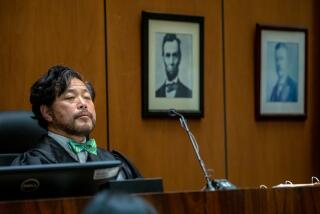San Diego Jurist Bars Look at FBI Search Papers
- Share via
SAN DIEGO — U.S. Magistrate Irma E. Gonzalez on Wednesday denied a news media request to see sealed affidavits filed in support of the FBI’s search of Cubic Corp.’s Defense Systems subsidiary offices on June 14.
The affidavits, sought by the Los Angeles Times, the Copley Press, publisher of the San Diego Union and Tribune, and KCST-TV, are believed to give a detailed description of the government’s complex, two-year investigation into possible defense procurement fraud.
Similar affidavits were used to support search warrants in other locations around the country, and on Wednesday a judge in the U.S. Eastern District in Virginia denied a request made by the Washington Times to unseal materials on file in Alexandria, Va.
Gonzalez on June 13 authorized the search warrant that seven federal investigators used to search a pair of offices at Cubic’s Defense Systems subsidiary in San Diego. During their search, according to Cubic, government agents seized a six-inch stack of documents.
Gonzalez on Wednesday described the veil of secrecy surrounding the affidavits as “unique,” given the public’s general right to view search warrants and other judicial documents. However, Gonzalez said that the unusual level of secrecy is acceptable because the premature release of the affidavits could damage the government’s ongoing investigation into possible widespread defense procurement fraud.
Those documents “contain a lot of information which the public has no knowledge of yet,” according to Gonzalez, who added that the information is being studied by a federal grand jury in Virginia. She described the affidavits as intricate “road maps” that catalogue the government’s undercover investigation.
Gonzalez agreed with Assistant U.S. Atty. George Hardy’s contention that possible suspects who have not yet been questioned about the growing investigation might destroy valuable evidence--or flee the country--if the affidavits were unsealed.
A sealed document filed recently in San Diego by the Justice Department described two instances where documents were almost destroyed after a similar affidavit was unsealed in Dallas, according to Gonzalez.
More to Read
Inside the business of entertainment
The Wide Shot brings you news, analysis and insights on everything from streaming wars to production — and what it all means for the future.
You may occasionally receive promotional content from the Los Angeles Times.










